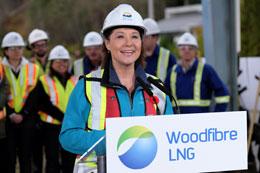Troubling times for BC’s LNG dreams

By Mata Press Service
The bidding process for contracts to build the C$40 billion LNG Canada liquefied natural gas project in British Columbia has been cancelled, further jeopardizing the provincial government’s hopes of reaping billions from a gas bonanza.
Lead contractor CFSW LNG Constructors has, in a surprise move, cancelled the bidding process covering fabrication of production modules for the liquefied natural gas project, operated by a Shell-led consortium, reported Upstream, the industry’s global news publication.
Sources involved in the tender exercise told Upstream they were only recently informed by CFSW of the cancellation, having submitted bids back in March 2016 and having held numerous clarification meetings over the past six months.
Low commodity prices have been causing cash flow problems for oil and gas companies, which is understood to have spurred the decision by project partners to shelve the contracts for engineering, procurement and construction of modules for the two-train LNG plant, Upstream reported.
“The bids for module fabrication have now been cancelled with no award to be made,” a source from one of the contenders told Upstream.
All bidders competing for the contracts are understood to be Asian yard groups. Sources suggested the presumed frontrunner for the EPC awards was Japanese engineering giant Chiyoda, which had lined up Chinese yard Bomesc Offshore Engineering as a subcontractor for the job.
Chiyoda is also one of the four joint venture partners that make up lead contractor group CFSW, along with Foster Wheeler, Saipem and WorleyParsons. CFSW was in 2014 awarded the key contract from LNG Canada for front-end engineering and design.
The cancellation casts a cloud over when, if ever, Shell and its project partners will be able to make a final investment decision on LNG Canada. The project consortium revealed in July that the investment decision would delayed until late this year, as it sought to reduce costs in response to lower commodity prices.
The LNG Canada project includes the design, construction and operation of a two-train gas liquefaction plant and facilities for the storage and export of LNG in Kitimat, British Columbia.
Each train featured an LNG processing capacity of 6 million tonnes per annum, with options to expand the project by another two trains in a second phase. The project was ultimately intended to reach an export capacity of 26 million tpa.
Under the original timeline, design and construction of the first phase was projected to take about five years to complete.
LNG Canada has already been granted a 25-year export licence from federal and provincial governments of Canada and British Columbia for the proposed project.
In March 2015, CFSW approached yards in Singapore, Malaysia, Thailand, the Philippines, South Korea and China, requesting expressions of interest to bid for the module design and construction work.
In June 2015, the Canadian Environmental Assessment Agency (CEAA) and the British Columbia Environmental Assessment Office (EAO) conditionally approved the project’s environmental impact assessment.
The LNG Canada consortium includes operator Shell Canada Energy with 50%, PetroChina with 20%, Korea Gas with 15% and Mitsubishi of Japan with 15%.
This news comes as another major LNG project in BC is being reassessed.
According to Rich Coleman, British Columbia’s minister of natural gas development.
Malaysia’s Petroliam Nasional Bhd. (Petronas) will be ready to decide whether to proceed with a proposed C$36 billion liquefied natural gas plant on Canada’s Pacific Coast by April.
The state-owned Malaysian energy company, which won conditional Canadian government approval in September after more than three years of regulatory review, is in the process of reassessing the project’s costs, including those of steel, pipes and other inputs, he said.
“They need to go out and re-price the project,” Coleman said in an interview with FP in Vancouver. “They hope to have that done in three to six months. Once they’ve done that, they’ll go back to the partners and decide whether to make a final investment decision.”
This project, to be built along with partners from China, Japan, India, and Brunei
is located on Lelu Island near Prince Rupert on B.C.'s northern coast.
Construction was originally scheduled to start in 2015, but the approval has been mired over concerns about the impact on fish, wildlife and the traditional ways of life of First Nation tribes in the region.
Earlier this year, Petronas laid off some 1,000 employees as dropping crude oil prices resulted in falling revenues for the Malaysian national oil and gas company.
A third but smaller WoodFibre LNG export project north of Vancouver took a positive investment decision on the $1.6-billion export terminal recently.
The 2.1-million-ton processing facility has the support of the local Squamish First Nation, but two nearby nations have voiced concerns about a gas pipeline that will supply the plant. If those differences are overcome, WoodFibre LNG will be the first LNG export project on Canada’s west coast. – with agencies.
The LNG dream in BC
The Government of B.C. released its LNG Strategy in February 2012. This document laid out the vision for an LNG industry in B.C. Since then…
20 LNG export projects have been proposed.
18 export licenses have been approved by the National Energy Board. The NEB is an independent federal regulatory tribunal. When the NEB approves an export license, it gives permission for an LNG export facility to export LNG for a specified amount of time.
9 environmental assessments have been completed, with five more underway. This means that a project’s environmental impact has been assessed by both B.C.’s Environmental Assessment Office and the Canadian Environmental Assessment Agency.
An estimated $20 billion dollars has been spent in B.C. by industry. This money has been invested by project proponents as they work to develop their projects.









